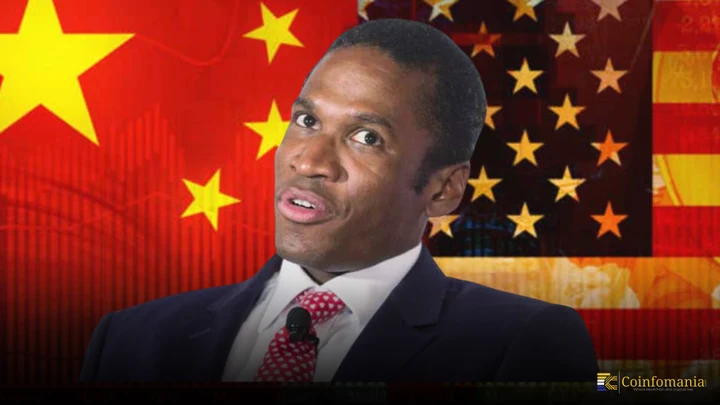Arthur Hayes Reacts to US-China Tariff Truce as Crypto Emerges as Capital Control Hedge
0
0

As the world becomes more uncertain geopolitically, crypto strategist and BitMEX co-founder Arthur Hayes has emerged as the cautionary ear. Following a 90-day tariff pact between the US and China, Hayes warns of a much wider, more long-term shift masked by such short-term shifts. Hayes sees the undercurrent of this pause as the slow ascendancy of capital controls and writes that cryptocurrency is growing even more critical of that. Hayes argues that capital checkpoints establish the staging for future contracts.
Temporary Tariff Truce Conceals Deep Economic Fractures
On May 12, 2025, the US and China agreed to reduce tariffs on each other in 90 days. The US has reduced its import tariff on Chinese goods from 145% to 30%. On the other hand, China intends to reduce its tariff on US merchandise from 125% to 10%. When seen as a short break for both countries to sit and resolve their differences, many people celebrate this as a great diplomatic gain.
Nevertheless, in Hayes’s view, this short-term truce achieves minimal impact upon the deeper economic hostilities between the two countries. He reads it as a temporary break from tensions, not an end to the economic cold war. According to Arthur Hayes, the current policy changes are hiding deeper fiscal concerns, with nations turning to short, abrupt steps as they prepare for harsher and longer-term arrangements on financial regulation.
With the current state of mistrust of economics, cryptocurrency is growing as attractive to people, not only as a volatile investment but as an independent financial system that doesn’t require government attention.
Texas Land Ban Mirrors Rise of Economic Nationalism
This is yet another example of economic nationalism reflected in the Texas House’s approval of Senate Bill 17, limiting the land ownership rights of citizens and bodies of China, Iran, North Korea, and Russia. Supporters see it as a security issue, while opponents emphasise the danger of unequal treatment and injury to law-abiding residents.
As per Arthur Hayes, the legislation isn’t a land-focused law but rather a general statement. This implies that policies on the defense of domestic economies have broadened beyond the existing barriers in trade. Now, economic protectionism is going beyond the premises of trade deals to restrict access to tangible and financial assets locally. In other words, capitals are controlled by another name.
Digital assets such as Bitcoin and decentralized stablecoins become a means of financial expression when the government regulates traditional markets. If traditional assets are limited by citizenship, borderless digital assets provide a freely available international financial network.
Crypto Becomes the Hedge Against Capital Lockdowns
According to Arthur Hayes, it’s not inflation or central bank policy but capital controls that will trigger the next big wave of crypto adoption. These current measures, as Hayes identified, are early warnings of this larger trend. The national leaders use various financial containment methods, ranging from curbing property rights to selectively altering tariff policies.
Because of their intrinsic nature, cryptocurrencies automatically counteract such restrictions. They belong to global, self-governed, and censorship-proof tools, valuable when governments deploy strict economic imperatives to seek national goals.
For Hayes, we are experiencing a decisive point in this process. Old tools, such as tariffs and diplomatic agreements, are being rapidly replaced by a new terrain of economic separating factors. When capital controls intensify globally, people will start turning to crypto to exercise sovereignty, not for profit but to control assets and protect their privacy.
Capital Controls Fuel the Crypto Case
The media highlight short-lived tariff suspensions and windingly shredding land policies. However, Hayes recalls the hidden movement he perceives as essential: the increase in the degree to which countries pass more strict capital measures. Actions characterised as security or economic balance strategies often highlight the arising dynamic of how wealth flows across borders.
It is another proof that the crypto movement is moving in the right direction. The more restrictions placed on centralized financial systems, the more attractive it will become for someone to pursue decentralized and permissionless alternatives such as Bitcoin. From Hayes’s point of view, the expanding scarcity of capital flows will make cryptocurrencies indispensable for financial security.
The post Arthur Hayes Reacts to US-China Tariff Truce as Crypto Emerges as Capital Control Hedge appeared first on Coinfomania.
0
0
 Manage all your crypto, NFT and DeFi from one place
Manage all your crypto, NFT and DeFi from one placeSecurely connect the portfolio you’re using to start.


